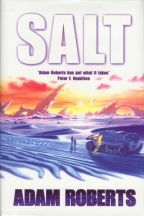Some writers take science fiction entirely seriously. That is,
they take the current consensus reality and try to extrapolate
current scientific and social trends into a realistic world of the
future. This results in a lot of fiction that's very popular and has
pretty much come to be taken as all that science fiction is. But
that's not at all the case. Science fiction can be broken down into
tools and tropes, just like any other genre. Some writers do not try
to predict the future, but instead to reflect the present. They wield
the tools of science fiction like a schoolboy's Erector set, using
tropes and tools to construct a world that enables them to engage in
dialectic. Stanislaw Lem is certainly one of the major authors to do
this, and as he points out, Philip K. Dick is prone to this technique
as well. British author Adam Roberts is a definite toolkit fan, and
he shows this coming right out of the box in his first novel, 'Salt'.
Yes, 'Salt' has spaceships and alien planets. But it is certainly not
about space exploration, or the conditions we might meet on another
world. 'Salt' is about the conditions we meet in the human heart,
every single damn day.
As 'Salt' begins, the human race has the means to colonize the
stars, but not the best equipment to determine which stars should be
colonized. Thus it is that humans end up on Nebel 2, which becomes
known as Salt, a less than auspicious desert planet with barely
enough resources to support human life. 'Salt' is told for the most
part from the point of view of two of the men who lead the two
factions that arrive. Alas, one of the factions consists largely of
devout religious conservatives, while the other faction (from the
trailing ship, a cause of grief in it's own right) consists largely
anarchists, who reject the idea of government. Barlei becomes the
designated leader of conservative Senaar, while Petja becomes the
default go-to man for the Alsists. But these two very human cultures
cannot co-exist, not on Earth, or on any planet. The human heart is
too hard. The bad decisions it can make are too easy.
Roberts tells the story in these dueling first-person voices, both
hypnotic and convincing. As the colonists disperse across the surface
of this bitter, barren planet, the factions separate and the battles
begin, each culture using the tools it knows best to adapt and
survive. Barlei is full of himself and the superior ways of his
people. Petja is as well, though he seems initially more sympathetic.
Both are the products the of the far sides of the human world,
however, and there is no way for them to change the feelings and
emotions within, even though these same have driven them to the
stars. Conflict arises, bloody, gritty, fought with the conviction
that each side carries that it alone is acting in some fashion that
is "right" or "best". Suffering be damned. The human race is damned,
and not from without, not by the limitations of this world -- or any
other. We are damned from within. Let Adam Roberts show you the
prettiest ugly picture you might ever see.
The two characters here will for some readers be all too real.
This world, Salt, is filled with unpleasant people and they
precipitate unfortunate events. Roberts' sterile thought-lab is as
striking as the latest battle-weary headline. It will take some
perseverance to run the gamut, to finish Roberts' brutal experiment,
but it's worth the effort. You'll find some the finest unpleasant
writing since Flannery O'Connor showed us a man who would steal a
girl's wooden leg, described the event and made us enjoy the reading
experience. 'Salt' is extremely well written, and the prose glides
by, even as Roberts delivers one poison arrow after another. It
doesn't matter how big the universe it. It cannot hide from the human
heart.
